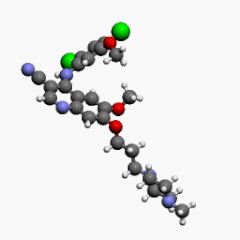Bosutinib
 | |
 | |
| Clinical data | |
|---|---|
| Trade names | Bosulif |
| License data | |
| Routes of administration | By mouth |
| ATC code | |
| Legal status | |
| Legal status | |
| Pharmacokinetic data | |
| Protein binding | 94–96% |
| Metabolism | By CYP3A4, to inactive metabolites |
| Elimination half-life | 22.5±1.7 hours |
| Excretion | Fecal (91.3%) and kidney (3%) |
| Identifiers | |
| |
| CAS Number | |
| PubChem CID | |
| IUPHAR/BPS | |
| DrugBank | |
| ChemSpider | |
| UNII | |
| KEGG | |
| ChEBI | |
| ChEMBL | |
| CompTox Dashboard (EPA) | |
| ECHA InfoCard | 100.149.122 |
| Chemical and physical data | |
| Formula | C26H29Cl2N5O3 |
| Molar mass | 530.45 g·mol−1 |
| 3D model (JSmol) | |
| |
| |
| | |
Bosutinib, sold under the brand name Bosulif, is a small molecule BCR-ABL and src tyrosine kinase inhibitor used for the treatment of chronic myelogenous leukemia.[2]
Originally synthesized by Wyeth, it is being developed by Pfizer.[citation needed]
Mechanism
[edit]It is an ATP-competitive Bcr-Abl tyrosine-kinase inhibitor with an additional inhibitory effect on Src family kinases (including Src, Lyn and Hck).[3][4] It has also shown activity against the receptors for platelet derived growth factor and vascular endothelial growth factor.[5] Bosutinib inhibited 16 of 18 imatinib-resistant forms of Bcr-Abl expressed in murine myeloid cell lines, but did not inhibit T315I and V299L mutant cells.[3]
Bosutinib is metabolized through CYP3A4.
Medical uses
[edit]Bosutinib received US FDA and EU European Medicines Agency approval in September 2012, and March 2013, respectively for the treatment of adults with Philadelphia chromosome-positive (Ph+) chronic myelogenous leukemia (CML) with resistance, or intolerance to prior therapy.[6][7][8][9]
Contraindications
[edit]Bosutinib has two known absolute contraindications, which are: known hypersensitivity to bosutinib and liver impairment.[10][11]
Interactions
[edit]Bosutinib is both a substrate and an inhibitor of P-glycoprotein (P-gp) and CYP3A4.[3] Hence P-gp and CYP3A4 inhibitors may increase plasma levels of bosutinib.[3] Likewise CYP3A4 inducers may reduce plasma concentrations of bosutinib.[3] It may also alter the metabolism and uptake (into the GIT by means of its P-gp inhibitory effects) of other drugs that are substrates for P-gp and CYP3A4.[3]

Notes
[edit]See also
[edit]References
[edit]- ^ "Prescription medicines: registration of new chemical entities in Australia, 2014". Therapeutic Goods Administration (TGA). 21 June 2022. Archived from the original on 10 April 2023. Retrieved 10 April 2023.
- ^ Lipton JH, Brümmendorf TH, Sweet K, Apperley JF, Cortes JE. Practical considerations in the management of patients treated with bosutinib for chronic myeloid leukemia. Ann Hematol. 2024 Jul 18. doi: 10.1007/s00277-024-05851-4. Epub ahead of print. PMID: 39023573.
- ^ a b c d e f "Bosulif (bosutinib) dosing, indications, interactions, adverse effects, and more". Medscape Reference. WebMD. Archived from the original on 3 January 2014. Retrieved 3 January 2014.
- ^ Daud AI, Krishnamurthi SS, Saleh MN, Gitlitz BJ, Borad MJ, Gold PJ, et al. (February 2012). "Phase I study of bosutinib, a src/abl tyrosine kinase inhibitor, administered to patients with advanced solid tumors" (PDF). Clinical Cancer Research. 18 (4): 1092–100. doi:10.1158/1078-0432.CCR-11-2378. PMID 22179664.
- ^ Bosutinib. 2012. Archived from the original on 3 April 2018. Retrieved 2 April 2018.
{{cite book}}:|website=ignored (help) - ^ Cortes JE, Kantarjian HM, Brümmendorf TH, Kim DW, Turkina AG, Shen ZX, et al. (October 2011). "Safety and efficacy of bosutinib (SKI-606) in chronic phase Philadelphia chromosome-positive chronic myeloid leukemia patients with resistance or intolerance to imatinib". Blood. 118 (17): 4567–76. doi:10.1182/blood-2011-05-355594. PMC 4916618. PMID 21865346.
- ^ Cortes JE, Kim DW, Kantarjian HM, Brümmendorf TH, Dyagil I, Griskevicius L, et al. (October 2012). "Bosutinib versus imatinib in newly diagnosed chronic-phase chronic myeloid leukemia: results from the BELA trial". Journal of Clinical Oncology. 30 (28): 3486–92. doi:10.1200/JCO.2011.38.7522. PMC 4979199. PMID 22949154.
- ^ "Bosulif Approved for Previously Treated Philadelphia Chromosome-Positive Chronic Myelogenous Leukemia". 5 September 2012. Archived from the original on 24 September 2015. Retrieved 6 September 2012.
- ^ "Bosulif : EPAR - Product Information" (PDF). European Medicines Agency. Pfitzer Ltd. 9 April 2013. Archived (PDF) from the original on 3 January 2014. Retrieved 3 January 2014.
- ^ "Bosulif 100mg and 500mg Tablets - Summary of Product Characteristics (SPC)". electronic Medicines Compendium. Pfitzer Limited. 7 June 2013. Archived from the original on 3 January 2014. Retrieved 3 January 2014.
- ^ "BOSULIF (bosutinib monohydrate) tablet, film coated [Pfizer Laboratories Div Pfizer Inc]". DailyMed. Pfitzer Inc. September 2013. Archived from the original on 3 January 2014. Retrieved 3 January 2014.
External links
[edit]- "Bosutinib". Drug Information Portal. U.S. National Library of Medicine.
